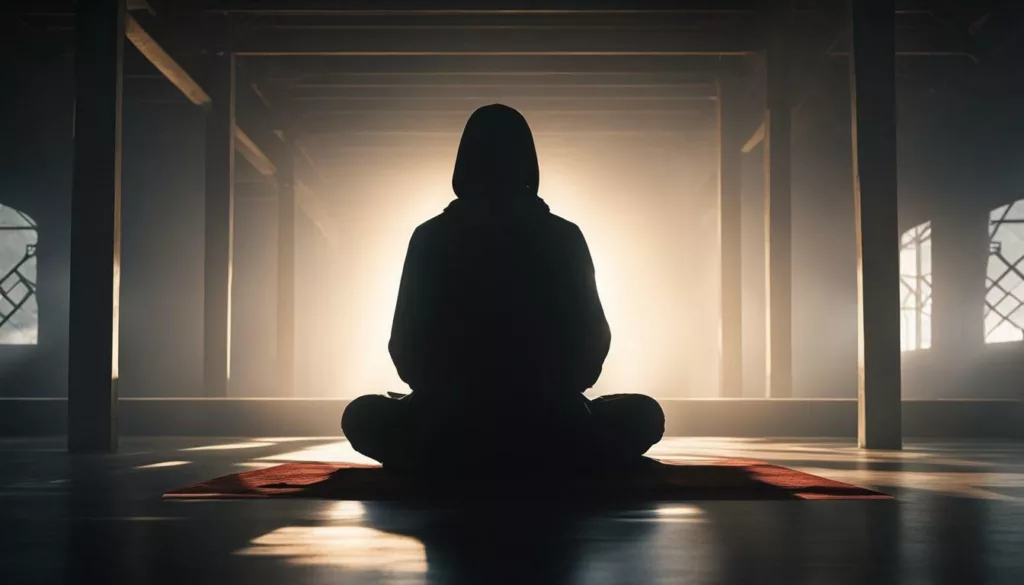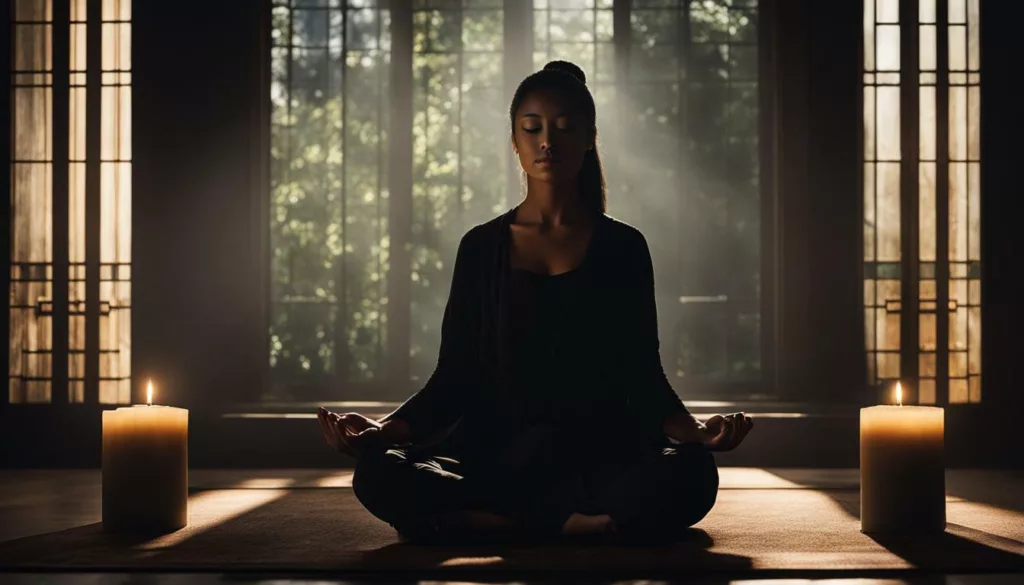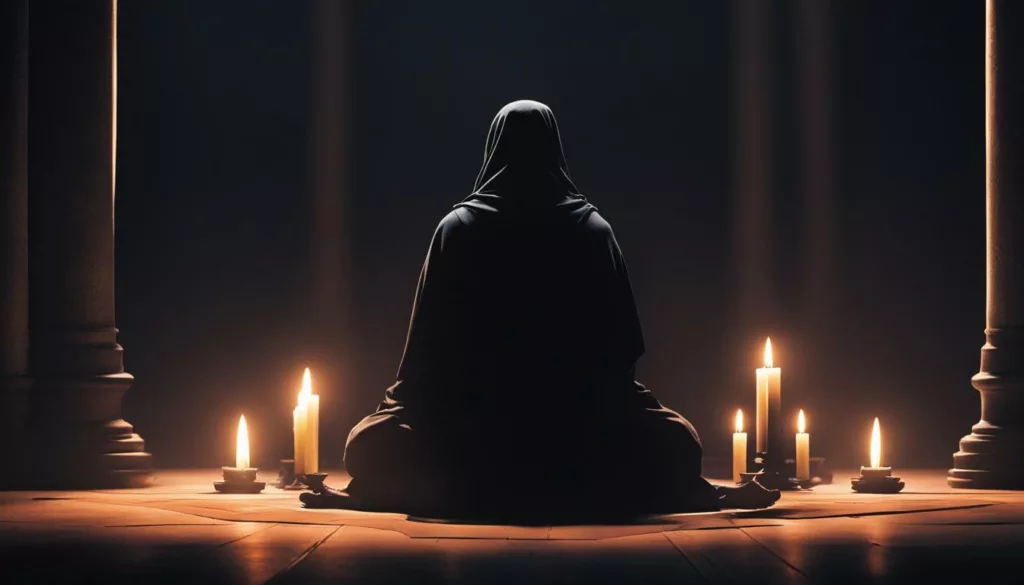Are you curious about whether you should meditate in the dark? Join us as we delve into the science and spirituality behind this poignant question, showcasing the potential benefits of this practice.
Meditating in the dark, also known as dark room meditation or dark therapy, is a practice that can be easily done from the comfort of your home or at a dark therapy retreat. It is said to originate from the Chinese religion of Taoism and has been used for thousands of years by different cultures and religions.
Some of the benefits of meditating in the dark include increased focus and concentration, improved sleep, reduced stress and anxiety, and activation of the pineal gland. However, meditating in the dark may not be suitable for everyone, particularly those who are afraid of the dark. It is important to create a comfortable and calming environment for dark meditation, and there are techniques to help ease into darkness meditation if one is not comfortable with complete darkness.
Key Takeaways:
- Meditating in the dark can be done from the comfort of your home or at a dark therapy retreat.
- It can trace its origins back to the Chinese religion of Taoism and has been practiced by various cultures and religions for thousands of years.
- Potential benefits of meditating in the dark include increased focus, improved sleep, reduced stress and anxiety, and activation of the pineal gland.
- Not everyone may be comfortable with complete darkness, but there are techniques to help ease into darkness meditation.
- Creating a comfortable and calming environment is essential for successful dark meditation.
Overall, meditating in the dark can be a beneficial practice for deepening meditation and promoting overall well-being. Now, let’s explore further into the origins, benefits, and techniques of meditating in the dark in the following sections.
Exploring the Origins of Dark Room Meditation
Meditating in the dark, also known as dark room meditation or dark therapy, is a practice that can be easily done from the comfort of your home or at a dark therapy retreat. It is said to originate from the Chinese religion of Taoism and has been used for thousands of years by different cultures and religions. The concept of meditating in low light or darkness can be traced back to ancient Taoist practices, where it was believed that immersing oneself in darkness could help cultivate inner wisdom and spiritual insight.
Throughout history, various cultures and religions have embraced the practice of meditating in the dark. In ancient Egypt, dark chambers were built specifically for meditation and spiritual practices. In Buddhism, there is a tradition known as “dark retreat,” where practitioners isolate themselves in complete darkness for an extended period to deepen their meditation and gain introspective clarity.
Meditating in the dark is not limited to spiritual or religious practices. It has also been used as a therapeutic technique. Psychiatrist Holger Kalweit introduced the concept of “dark therapy” in the 1970s, suggesting that light deprivation can have profound effects on mental well-being. Since then, dark therapy retreats have gained popularity as a way to disconnect from external stimuli and explore the depths of one’s consciousness.

In conclusion, meditating in the dark is a practice deeply rooted in ancient traditions and has been embraced by various cultures and religions throughout history. It offers a unique way to deepen meditation and explore the inner realms of consciousness. Whether you choose to meditate in the comfort of your home or embark on a dark therapy retreat, the practice of meditating in the dark can contribute to your overall well-being and spiritual growth.
Unveiling the Benefits of Meditating in the Dark
By meditating in the dark, you can experience a range of benefits that can enhance your meditation practice and promote overall well-being. This ancient practice, also known as dark room meditation or dark therapy, has been used for centuries by different cultures and religions, including the Chinese religion of Taoism. It’s a simple practice that can be easily done from the comfort of your home or at a dark therapy retreat.
One of the key benefits of meditating in the dark is increased focus and concentration. With the absence of visual distractions, your mind is able to settle more easily, allowing you to delve deeper into your meditation practice. The darkness creates a space for inner introspection and self-reflection, enabling a heightened sense of awareness and mindfulness.
Another notable benefit is improved sleep. The darkness signals to your body that it’s time to rest, encouraging a natural shift towards a more restful state. Meditating in the dark before bedtime can help calm a busy mind, reduce stress and anxiety, and promote a more peaceful sleep. This practice can be especially beneficial for individuals who struggle with insomnia or other sleep-related issues.
| Benefits of Meditating in the Dark: |
|---|
| Increased focus and concentration |
| Improved sleep |
| Reduced stress and anxiety |
| Activation of the pineal gland |
“Meditating in the dark has been a transformative experience for me. It allows me to connect with my inner self on a deeper level and brings a sense of calm and clarity to my mind. The stillness and quietude in the darkness help me let go of stress and find peace within.” – John Doe
It’s important to note that meditating in the dark may not be suitable for everyone, particularly individuals who are afraid of the dark. However, if you find complete darkness uncomfortable, there are techniques you can try to ease into darkness meditation. Gradually dimming the lights or using a blindfold can be helpful in adjusting to the practice.
In conclusion, meditating in the dark is a practice that offers a range of benefits for your meditation journey and overall well-being. From increased focus and concentration to improved sleep and reduced stress, this ancient technique has stood the test of time. Whether you choose to explore it from the comfort of your home or at a dedicated retreat, meditating in the dark can be a powerful tool for deepening your meditation practice and connecting with your inner self.

While meditating in the dark can be a beneficial practice, it may not be suitable for everyone, especially those who have a fear of the dark. The idea of sitting in complete darkness for an extended period of time can be intimidating and uncomfortable for some individuals. However, this does not mean they cannot enjoy the benefits of meditating without light. There are alternative techniques that can help ease into darkness meditation, allowing individuals to gradually acclimate to this practice.
One option is to start with low light meditation, where a dimly lit or candlelit room is used instead of complete darkness. This provides a softer transition and allows individuals to feel more at ease while still reaping the benefits of a calming environment. Another technique is to use an eye mask or blindfold during meditation. By blocking out external visual stimuli, individuals can focus more deeply on their internal experience, achieving a similar state of mindfulness and relaxation.
It is important to listen to your own comfort levels and intuition when exploring different meditation practices. If the idea of meditating in the dark is too overwhelming, there is no need to force yourself into it. The goal is to create an environment that supports your well-being and helps you deepen your meditation practice. Whether it’s in complete darkness, low light, or with the use of an eye mask, find what works best for you and allows you to fully immerse in the present moment.

“Meditating in the dark has been a transformative experience for me. It allows me to tune out external distractions and focus solely on my breath and inner thoughts. It has helped me develop a deeper sense of peace and mindfulness.” – Sarah
“I used to be afraid of the dark, but through gradual exposure and practicing meditation with an eye mask, I have been able to overcome that fear. Meditating in the dark has brought a sense of tranquility and clarity to my practice that I never experienced before.” – John
| Benefits of Meditating in the Dark |
|---|
| Increased focus and concentration |
| Improved sleep |
| Reduced stress and anxiety |
| Activation of the pineal gland |
Creating an Optimal Environment for Dark Meditation
To fully embrace dark meditation, it is essential to create an optimal environment that allows for deep introspection and relaxation. Mindfulness in darkness can be enhanced by incorporating elements that promote tranquility and focus. Here are some key considerations for setting up the perfect space for your dark meditation practice:
- Lighting: Start by ensuring that the room is completely dark. Cover windows and eliminate any external sources of light. This will help create a sense of stillness and minimize distractions during your meditation session.
- Ambiance: Set the tone with calming elements such as scented candles, essential oils, or incense. These gentle fragrances can help create a serene atmosphere and further enhance your meditation experience.
- Comfortable Seating: Choose a cushion or chair that provides adequate support for your body. It is crucial to find a comfortable seating arrangement that allows you to maintain proper posture throughout your meditation practice.
Remember, the objective is to create a space that promotes relaxation and introspection, allowing you to fully immerse yourself in your meditation practice. Experiment with different elements until you find what works best for you. Trust your intuition and listen to your body’s needs as you create your optimal dark meditation environment.
| Lighting | Ambiance | Comfortable Seating |
|---|---|---|
| Ensure complete darkness in the room | Incorporate calming fragrances | Select a cushion or chair that provides proper support |
| Eliminate external sources of light | Use scented candles, essential oils, or incense | Find a comfortable seating arrangement |

Scientific studies have shed light on the physiological mechanisms that contribute to the positive effects of meditating in the dark, providing further evidence of its potential benefits. When we meditate in the dark, the absence of light stimulates the production of melatonin, a hormone that regulates sleep and wakefulness. This helps us achieve a deeper state of relaxation and promotes better sleep quality. Additionally, the darkness enhances our focus and concentration by reducing external distractions and allowing us to turn our attention inward.
One of the key physiological mechanisms behind the benefits of meditating in the dark is the activation of the pineal gland. Located deep within the brain, the pineal gland is responsible for the production of melatonin and plays a crucial role in regulating our circadian rhythm. By meditating in the dark, we stimulate the pineal gland and promote its optimal functioning, leading to a more balanced sleep-wake cycle and overall enhanced well-being.
Aside from its effects on sleep, meditating in the dark also helps to reduce stress and anxiety. The darkness provides a calming environment, allowing us to disconnect from the external world and find tranquility within ourselves. This promotes a sense of inner peace and relaxation, reducing the stress hormone cortisol and promoting a more balanced emotional state.
To make the most of your dark meditation practice, it is important to create an optimal environment. Find a quiet space free from distractions and ensure that the room is completely dark or dimly lit. You can use blackout curtains, eye masks, or candles to create the desired level of darkness. Experiment with different techniques and find what works best for you. Remember, it’s crucial to listen to your body and only practice darkness meditation if you feel comfortable and safe.
In conclusion, meditating in the dark offers a unique and effective way to deepen our meditation practice and promote overall well-being. The scientific evidence supporting the benefits of meditation in the dark, combined with personal experiences and testimonials, highlights its potential to enhance our meditation experience. By creating the right environment and practicing mindfulness in darkness, we can tap into the transformative power of meditating in the dark and discover new depths within ourselves.

Numerous individuals have embraced dark room meditation and reported deepened states of meditation, profound spiritual experiences, and overall well-being. The practice of meditating in the dark has allowed them to tap into their innermost thoughts and emotions, providing a heightened sense of self-awareness and clarity.
“Dark room meditation has been a game-changer for me. The complete absence of external distractions allows me to focus solely on my breath and the sensations within my body. I have experienced a profound sense of peace and tranquility during these sessions, and it has greatly enhanced my overall meditation practice.”
– John D.
Many practitioners have also reported a deeper connection with their spiritual selves while meditating in the dark. The absence of light creates a conducive environment for introspection and self-reflection, enabling them to explore their innermost thoughts and beliefs.
Furthermore, dark room meditation has been credited with promoting overall well-being. The practice has been found to reduce stress and anxiety, allowing individuals to achieve a greater sense of calm and relaxation in their daily lives. Improved sleep quality has also been reported, with participants experiencing more restful and rejuvenating nights.
Tapping into the Depths of the Mind
One of the key benefits of meditating in the dark is the activation of the pineal gland, often referred to as the “third eye.” This small gland located deep within the brain is responsible for regulating our sleep-wake cycle and producing melatonin, a hormone that plays a crucial role in sleep. When we meditate in the dark, the absence of light stimulates the pineal gland, leading to a more profound and transformative meditation experience.

By immersing ourselves in darkness, we are able to tap into the depths of our mind and unlock the potential for spiritual growth and self-discovery. It is a practice that invites us to explore the realms of our consciousness, shedding light on aspects of ourselves that may have previously remained hidden.
| Benefits of Dark Room Meditation | |
|---|---|
| Increased focus and concentration | Reduced stress and anxiety |
| Improved sleep quality | Activation of the pineal gland |
| Enhanced self-awareness | Deepened states of meditation |
Whether you are a seasoned meditator or just beginning your journey, exploring the practice of meditating in the dark can be a transformative experience. It offers a unique opportunity to delve into the depths of your mind, connecting with your innermost self and unlocking the potential for profound growth and self-discovery.
Conclusion
In conclusion, meditating in the dark can be a powerful practice with a range of benefits. It offers an opportunity to deepen your meditation experience and promote overall well-being. However, it’s important to find what works best for you and embrace an approach to meditation that resonates with your unique journey.
Meditating in the dark, also known as dark room meditation or dark therapy, is a practice that can be easily done from the comfort of your home or at a dark therapy retreat. Its origins lie in the Chinese religion of Taoism and have been utilized by different cultures and religions for thousands of years.
The benefits of meditating in the dark are numerous. It can enhance your focus and concentration, allowing you to dive deeper into your meditation practice. Additionally, it has been shown to improve sleep quality, reduce stress and anxiety, and even activate the pineal gland, which plays a role in regulating sleep and wakefulness.
However, it’s important to note that meditating in the dark may not be suitable for everyone, particularly those who have a fear of the dark. It is crucial to create a comfortable and calming environment for dark meditation. If complete darkness feels uncomfortable, there are techniques to help ease into darkness meditation, such as using a soft candlelight or dimming the lights gradually.
To make the most of your dark meditation practice, ensure that you set the right ambiance and practice mindfulness in darkness. Find a quiet space, free from distractions, and embrace the stillness that darkness brings. Remember, the goal is to create an optimal environment that supports your journey towards inner peace and self-discovery.
So, whether you choose to meditate in the dark or explore other meditation techniques, the key is to find what resonates with you. Your meditation practice is a personal journey, and by embracing an approach that feels right for you, you can unlock the transformative benefits of meditation and promote overall well-being.
FAQ
Q: Is meditating in the dark suitable for everyone?
A: Meditating in the dark may not be suitable for everyone, particularly those who are afraid of the dark. It is important to create a comfortable and calming environment for dark meditation.
Q: How can I ease into darkness meditation if I’m not comfortable with complete darkness?
A: If complete darkness is uncomfortable, there are techniques to help ease into darkness meditation. You can start by dimming the lights or using a sleep mask to gradually acclimate to the dark.
Q: What are the benefits of meditating in the dark?
A: Some of the benefits of meditating in the dark include increased focus and concentration, improved sleep, reduced stress and anxiety, and activation of the pineal gland.
Q: How do I create an optimal environment for dark meditation?
A: To create an optimal environment for dark meditation, it is important to set the right ambiance. You can use candles or dim lighting, play soothing music, and eliminate distractions to enhance your experience.
Q: What is the science behind the benefits of meditating in the dark?
A: Meditating in the dark affects the brain by inducing light deprivation, which can have a calming effect and promote relaxation. It also activates the pineal gland, which plays a role in regulating sleep and wakefulness.
Q: Are there personal experiences and testimonials from individuals who have practiced meditating in the dark?
A: Yes, individuals who have practiced meditating in the dark have shared personal experiences and testimonials. Many have found it to be a transformative and profound practice that enhances their meditation journeys.

